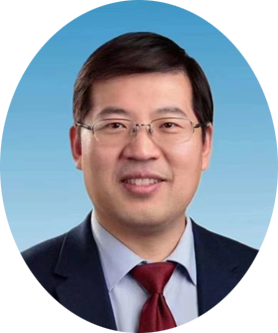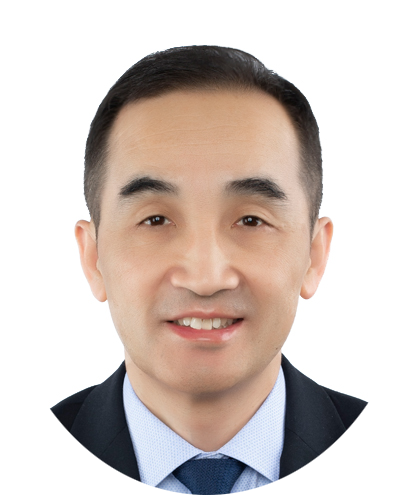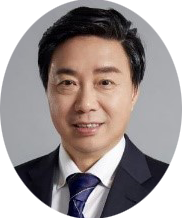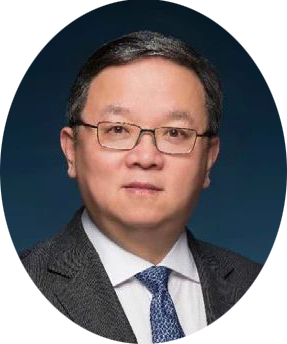特邀报告

报告题目:大数据智能化发展趋势与重邮方案
报告摘要:本报告首先介绍了数字技术与新基建给大数据发展带来的新机遇,进而分析了大数据技术的发展趋势,即数据安全、隐私保护以及与人工智能的深度融合,引出了人工智能发展现状和趋势分析,并着重介绍了人机混合增强智能的必要性和未来研究方向。最后,介绍了重庆邮电大学在大数据智能化方面的布局及研究重点。
个人简介:高新波,博士,教授,重庆邮电大学校长,新世纪百千万人才工程国家级人选,国家杰出青年科学基金获得者,科技部重点领域创新团队负责人、教育部创新团队负责人,教育部高等学校计算机类专业教学指导委员会委员。英国工程技术学会会士、中国电子学会会士、中国计算机学会杰出会员。主要从事人工智能、机器学习、计算机视觉、模式识别等领域的研究和教学工作。

报告题目:大数据技术及应用
报告摘要:随着电信行业,医院信息化以及数字政府建设的持续推进,与移动网络、健康医疗、社会治理密切相关的大数据应用成为热点。目前,广泛覆盖的信息化建设项目累积了海量数据,而如何精准的利用这些数据,是未来大数据技术发展的关键。 本报告将围绕大数据分析基础研究及其在通信网络、医疗等领域的应用来介绍深圳市大数据研究院近年来的研究成果,并对5G现实场景中的前沿问题进行探讨
个人简介:1984年毕业于北京大学数学系,1989年获美国麻省理工学院运筹学博士学位,2014年当选加拿大皇家科学院院士。现任香港中文大学(深圳)副校长,深圳市大数据研究院院长。兼任:国家自然科学基金等评审专家; IEEE会士;美国工业与应用数学学会(SIAM)会士。
长期从事优化理论、算法设计以及其在信息科学中的应用等研究。因其在最优化领域的开创性贡献,荣获2010年美国运筹学和管理学研究协会(INFORMS)颁发的Farkas奖以及2018年Paul Y. Tseng 连续优化纪念奖。他在优化、信号处理及通信等领域的研究成果分别获得2004年、2009年、2011和2015年IEEE信号处理学会、2011年国际通信大会以及2011年欧洲信号处理学会的最佳论文奖。

报告题目:HAO智能:HI + AI + OI
报告摘要:大数据面向异构自治的多源海量数据, 旨在挖掘数据间复杂且演化的关联。 大数据知识工程(BigKE)从大数据的 HACE原理开始, 从大知识建模的角度,旨在利用海量、低质、无序的碎片化知识来构建新型的知识生成和知识服务平台。当大知识被有效应用到复杂环境进行问题求解时,才能生成大智慧。本报告介绍HACE原理、BigKE模型和大智慧系统的核心元素,即HI+AI+OI形成HAO智能,分析和例证行业人工智能研发中的HAO智能服务。
个人简介:海外杰青、IEEE Fellow、AAAS Fellow(美国科学促进协会院士)。 现任明略科技集团首席科学家、高级副总裁和明略科学院院长; 合肥工业大学大知识科学研究院院长、教授、博士生导师; [营销智能国家新一代人工智能开放创新平台负责人;大数据知识工程教育部重点实验室主任; 国家重点研发计划项目首席科学家 ;教育部创新团队带头人。

报告题目:Future of Computing
报告摘要:In this talk, we examine potential developments in the field of computing. Recall that Computer Science is defined as the science of algorithms. The development of computer science and its applications have relied on two cornerstones: Mathematical logic and semiconductor technology. Computing, i.e., execution of an algorithm, is a process of evaluating a logical expression; by the principles of mathematical logic, all logical expression is a combination of simple logical operations, namely, "and", "or", and "not". Thanks to semiconductor technology, these logical operations can be implemented in a substantial manner with high density, high reliability, and low cost. Based on these two cornerstones, the complexity theory has been the major theoretical development of Computer Science. According to this theory, computing problems can be classified as "easy" and "hard". Easy ones are those in which the computation time is bounded by a polynomial of input size. The majority of computing applications today are in this category. In the future, we must focus on hard problems. One approach is to use non-semiconductor-based physical devices; initial work in quantum computers would fall within this category. Another approach is to develop heuristic algorithms with much lower complexity; this is very much an objective of "Artificial Intelligence" development. The third approach is to leverage properties inherently located within input data, hence improving the computation efficiency. With this preamble, we argue that because data are de facto representations of natural phenomena, they naturally should have their own inherent rules. With this, in today’s age of enlightenment, there is a call for the creation and development of "data science," the objective of which is to discover such rules.
个人简介:An internationally renowned scholar, Professor Wei Zhao has served important leadership roles in academic including the Chief Research Officer (i.e., Vice President for Research) at the American University of Sharjah, the eighth Rector (i.e., President) of the University of Macau, the Dean of the School of Science at Rensselaer Polytechnic Institute, the Director for the Division of Computer and Network Systems in the U.S. National Science Foundation, and the Senior Associate Vice President for Research at Texas A&M University. He was also on faculty in Shaanxi Normal University, Amherst College, Adelaide University, and Shenzhen Institutes of Advanced Technology. Professor Zhao completed his undergraduate studies in physics at Shaanxi Normal University, China, in 1977, and received his MSc and PhD degrees in Computer and Information Sciences at the University of Massachusetts at Amherst in 1983 and 1986, respectively.
An IEEE Fellow, Professor Zhao has made significant contributions in cyber-physical system, distributed computing, real-time systems, computer networks, and cyberspace security. He led the effort to define research agenda of and to create the very first funding program for cyber-physical systems, when he served as the NSF CNS Division Director in 2006. His research group has received numerous awards. Their research results have been adopted in the standard of SAFENET (Survivable Adaptable Fiber Optic Embedded Network). In 2011, he was named by the Chinese Ministry of Science and Technology as the Chief Scientist of the national 973 Internet of Things Project. Professor Zhao was awarded the Lifelong Achievement Award by the Chinese Association of Science and Technology in 2005. In 2007, he was honored with the Overseas Achievement Award by the Chinese Computer Federation. Professor Zhao has been conferred honorable doctorates by 12 universities in the world and academician of the International Eurasian Academy of Sciences.

报告题目:数说防疫
报告摘要:新冠疫情爆发以来,数据科学在防疫过程中起到了非常大的作用,在我这个报告中,我从我们这几个月的具体工作中从传染病模型,防疫措施评价等几个方面來阐述我们一些在运用数据科学来抗击新冠的一些方法和一些工作。
个人简介:香港浸会大学副校长,帝国理工学院数据科学研究所所长,兼任上海大学计算机学院院长,英国皇家工程院院士,欧洲科学院院士,中国人工智能学会名誉副理事长,英国计算机学会院士 (FBCS)。主要研究方向为机器学习、数据科学、大规模科学数据管理,为许多重大研究项目作出了重要贡献,是英国和欧洲的几个主要数据科学项目的领军人物,发表学术论文 250 余篇。

报告题目:如何建立合规有效的数据要素市场?
报告摘要:2020年4月9日,中共中央、国务院发布《关于构建更加完善的要素市场化配置体制机制的意见》,首次将数据与土地、劳动力、资本、技术等传统要素并列为要素之一,提出要加快培育数据要素市场。数据要素有很多不同于其他要素的经济学特征,很多数据属于公共产品或准公共产品。数据要素有多种配置机制,市场化配置不等于数据的直接、集中化交易。本报告将结合数据科学和经济学,讨论以下问题:数据要素有哪些关键的经济学特征?数据要素的产权如何界定?数据要素的价值如何计量?数据要素有哪些配置机制?数据要素市场中将出现哪些中介结构?数据要素市场与开放银行、个人隐私保护之间是什么关系?密码学、区块链和物联网等技术将在数据要素市场中发挥什么作用?
个人简介:邹传伟博士,万向区块链首席经济学家 此前为比特大陆首席经济学家和南湖金服合伙人。2006年-2015年长期供职于中央汇金公司和中国投资公司,参与国有商业银行股份制改革和外汇储备境外投资管理。北京大学统计学学士、经济学硕士,清华大学五道口金融学院经济学博士,哈佛大学肯尼迪学院职业中期公共管理硕士。2015年因金融科技方面的研究获首届孙冶方金融创新奖和第五届中国软科学奖(前沿探索奖)。2019年入选第一财经“年度机构首席经济学家”。

报告题目:图神经网络 (GNN) 及自监督学习
报告摘要:图神经网络将深度学习方法延伸到非欧几里得的图数据上,大大提高了图数据应用的精度。在这个报告中,我将简单回顾一下图神经网络(GNN)并探讨如何提高GNN在图数据上的表示学习能力,并且有效避免传统GNN存在的过平滑(Over-smoothing)、过拟合(Over-fitting)以及鲁棒性差的问题,同时我也会探讨负采样在GNN表示学习中的重要性。其次我会介绍最近我们在GNN自监督学习(Self-supervised Learning)方面的一些工作。这些方法的有效性在包括阿里巴巴等多个超大规模数据集上得到验证。
个人简介:清华大学计算机系教授、系副主任,获杰青。研究人工智能、认知图谱、数据挖掘、社交网络和机器学习。发表论文300余篇,引用16000余次,获ACM SIGKDD Test-of-Time Award(十年最佳论文)。主持研发了研究者社会网络挖掘系统AMiner。担任IEEE T. on Big Data、AI OPEN主编以及WWW’21、CIKM’16、WSDM’15的PC Chair。获北京市科技进步一等奖、人工智能学会一等奖、KDD杰出贡献奖。